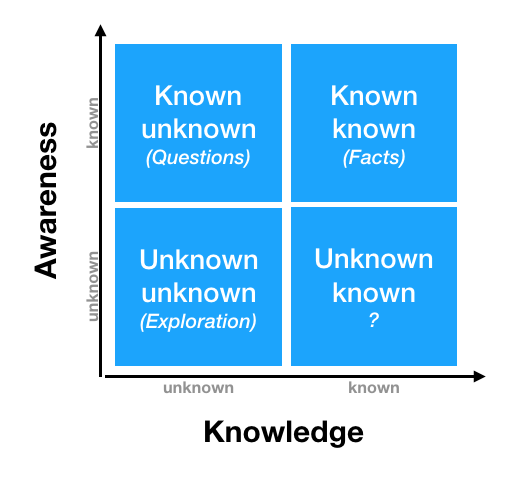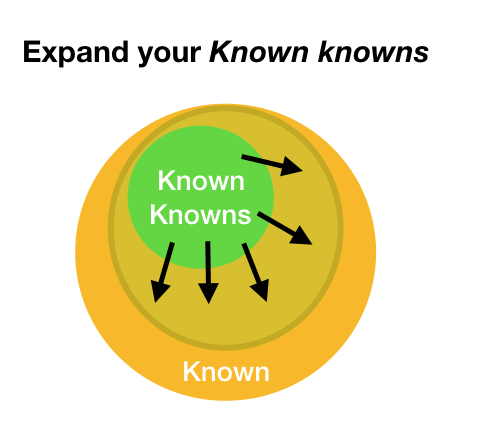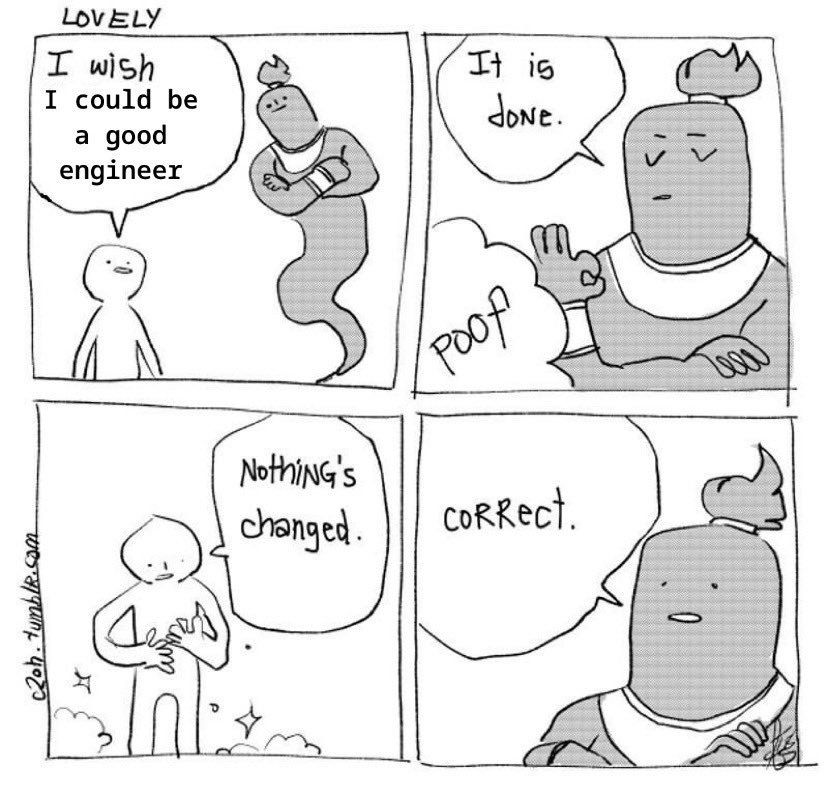How to Discover Your Unknown Knowns
 freeCodeCamp
freeCodeCamp
By Alon Kiriati
##
Known knowns, unknown knowns and unknown unknowns
It’s been almost twenty years since Donald Rumsfeld, the then US Secretary of State of Defense, said:
"There are things we know that we know. There are known unknowns. That is to say there are things that we now know we don't know. But there are also unknown unknowns. There are things we do not know we don't know. "
This saying is typically used to conduct risk management analysis by splitting the upcoming obstacles into 3 categories:
Known knowns — things that we know (i.e are aware of) that we know. These pose less of a risk, as they are facts we are confident in.
Known unknowns — things that we know (i.e. are aware of) that we don’t know — they imply a risk, but since we know them we can measure the risk, understand it and investigate more to make this a known known.
Unknown unknown — things we don’t know (i.e are not aware of) that we don’t know. These are probably the most dangerous since these encompass what we are not aware of and therefore can’t plan, analyze or take actions to mitigate them. You’ll have to do some thorough exploration to find the things you don’t know that don’t know.
It can get a little confusing when you put it that way, so let’s put it in a graph:

But wait… what about the unknown knowns? this is something Donald Rumsfeld didn’t discuss, but might be the most interesting.
The things you don’t know you know
The unknown knowns quadrant is often overlooked or just misinterpreted. I can easily understand why people don’t see the importance of it and just refer to it as a nonsense contradiction — how can someone not know something they already know?
Well, it turns out that your knowledge is based on many things you are not aware of — instincts, intuitions or other factors you think are trivial.
Think about your mother tongue. You can easily formulate any thought to an accurate sentence. As English is not my first language, I had to study it for years. I had to learn thousands of words to expand my vocabulary, learn the difference between a noun, a verb, an adjective and how to use them to construct a sentence. I had to learn the difference between present simple, present progressive, and past perfect. Even knowing when to use “on”, “in” or “at” is still a challenge for me. If English is your native language you might not even be aware of all these rules, you learned them when you were young and just know how to use them properly. Thus, you may also be unaware of the challenges others face when they try to speak English.
What can happen if you ignore the unknown known?
So far we’ve only tried to understand what these known unknowns are, but haven’t elaborated on why these matter at all. Ignoring the known unknowns leads to a problematic dissonance between facts (what you know) and your awareness (what you aren’t aware of). Ignoring them can be harmful and lead to situations, some of you know all too well:
“Imposter syndrome”
A few years ago I heard about imposter syndrome, and I immediately related to it. I always try to surround myself with people smarter than I am so I can learn and advance. The problem with that is that I always doubted my knowledge and felt like one day they will all expose my “secret” and realize that I’m not as good as I made my self out to be. I was terrified that one day they’ll demand to replace me with someone better. So far it didn’t happen (and I hope this post won’t give them any crazy ideas ?).
In the last couple of months, it was very hard to avoid stumbling upon an article, a talk, or a blog that didn’t mention imposter syndrome. Everybody loves talking about it, sharing their personal stories, and being proud of being a part of an exclusive group that has this syndrome. Well… guess what, almost all of us have it. Ask 20 of your friends if they ever felt like they aren’t good enough for their job or whether they ever doubted their accomplishments — I promise that almost all of them will be able to relate.
If that’s the case, is it really a syndrome? Perhaps people that always feel that they’re the best fit for the job have some “overconfidence syndrome”.
I’m sorry to burst your bubble and make you feel like you are not as “unique” as you thought. If you ask me, you are just like any other person who is unaware of what they know or appreciate the skills they have. If you’ve accomplished something or if people believe you are good at something, then you probably are. If you feel like you were just lucky or that people around you didn’t see you for the fraud that you are, then you probably have some problem in the way you perceive your skills and knowledge. This misperception means that your unknown known area is taking over the known known. You have a lot of knowns (which made you succeed) but the lack of awareness makes you feel like a fraud and is blinding your field of vision to the point that you are no longer able to see the positive qualities in you.
comprehension gaps
A few years ago I was trying to explain what I do at work to a young student- “We do a file sync & share product for SMBs. We have an out of the box SaaS, but clients can also buy S3 storage and install it on-premise”. While all that might sound trivial to people with entry-level experience in the field of cloud, this student looked at me like a deer in the headlights. To top it off, he was also too embarrassed that he barely understood a word.
Honestly, I don’t blame them because there was no way they could have know. This then got me to realize that I was ,in fact, the problem in that situation. By assuming that those terms were just common knowledge, I was ignoring my unknown knowns.

It’s important to note that unknown knowns aren’t limited to terminology. When you talk to grads or less experienced engineers (or other less experienced folks in your field), you may find that they too lack the knowledge that nowadays seems utterly “basic” to you.
Even when working with more experienced professionals, we sometimes don’t give enough context or drop enough details. In my field, I work on certain features for months at a time, adopt a particular team terminology and absorb individualized team practices. When I speak with other colleagues (especially those not in my team), I am entirely unaware of these knowns and assume that they’ll all intuitively understand how my team works.
These types of comprehension gaps often lead to misalignments because everyone tends of interpreting the implicit details differently. Being more aware of small details such as these and being more explicit about them, can reduce confusion and create better team alignment.
Feeling like you aren’t growing enough
At the start of my career, everything was new and I felt like I was learning new things every day. At some point, I started feeling like my learning curve is slowly diminishing. Eventually, it got to a point where I didn’t learn new languages or coding techniques every day because I was already familiar with the operational patterns… Turns out I was wrong about that.
In truth, I was learning a ton every single day. As a senior software engineer, I was doing more work that required “soft skills” such as communication, planning and team engagement. It was difficult to be mindful of these skills, when I only briefly thinking about what I’ve learned.
But even the “hard skills” that I’ve learned are tricky and easy to ignore: When I look back at last months I might only remember that I’ve learned GoLang, but if I dig deeper, I’ll find all those other sneaky unknown knowns which ARE the key factor in advancing my career to the next level.
It’s time to follow the yellow brick road

In the story of the Wizard Of Oz, Dorothy meets the Scarecrow, who wants a brain, the Tin Woodman, who desires a heart, and the Cowardly Lion, who needs courage. They all walk together, experience many adventures and overcome their challenges through the utilization of each others` strengths. When they get back to the Wizard of Oz, he explains to them that the attributes they sought after were within them all along. The way I see it, the journey on the yellow brick road simply cleared their blind spots and helped them see their unknown knowns.
Now it’s your turn.
How to hit your yellow brick road?

Now that you understand the importance of the unknown knowns, it’s important that you realize that this isn’t something that requires further exploration or analysis. All you need to do is give it the attention it deserves by turning the implicit knows into explicit ones. Turn to your intuition and unconscious beliefs; tap into your instincts and mold them into something you can make known to the rest of the world. By doing so, you’ll not only be able to better communicate your thoughts and knowledge to others, but also, help yourself finally raise awareness to your unknown knowns and thereby, become better at what you do.
You also understand that switching an unknown known into a known known, doesn’t require you to study anything new — all you need to do is to call it out and turning the implicit known into explicit known. Turning your intuitions, unconscious beliefs and instincts into something you can write/talk about will help you not only to communicate and share your knowledge with other, but can also help yourself be aware of the things you know and therefore be a better professional.
So what you can you do to reveal your unknown knowns?
Practical Ways of Revealing Your Unknown Knowns
 _Photo by [Unsplash](https://unsplash.com/@enka80?utm_source=unsplash&utm_medium=referral&utm_content=creditCopyText">Nine Köpfer on <a href="https://unsplash.com/search/photos/discover?utm_source=unsplash&utm_medium=referral&utmcontent=creditCopyText)
_Photo by [Unsplash](https://unsplash.com/@enka80?utm_source=unsplash&utm_medium=referral&utm_content=creditCopyText">Nine Köpfer on <a href="https://unsplash.com/search/photos/discover?utm_source=unsplash&utm_medium=referral&utmcontent=creditCopyText)
Write More
Either a blog, a draft or simply a document containing your reasoning behind a certain decision (i.e. why you preferred solution A over solution B). You’ll be surprised to learn that your seemingly simple ideas are far more profound after you write about them.
In my case, just a few days ago I thought about the unknown knowns. I didn't have more than 5 lines about this topic (actually I only wanted to tweet about it, but I didn't have twitter :) ) , but as you see it turned out to be much more than that.
Pursue Public Speaking Opportunities
Speak up and share what you’ve learned with others. Don’t assume that anything you say is trivial. The best talks I’ve heard weren’t necessary given by people who studied a subject field for 20 years, but rather, those who brought forth a fresh new perspective. Remember that it’s possible to hold a five-minute talk about any topic you desire because what may seem “easy” to you requires more context when speaking to others.
It doesn’t have to be at the biggest conference you can think of. Start with a 5 minutes talk to your team — I’m sure you have at least one thing to share with them. You’ll be amazed how many times my peers told me they won’t be able to hold a 5 talk about a topic they thought was trivial. After they’ve had the slides they asked for 10 minutes, and I was going on the safe side scheduled 15 minutes for them. It took about 20 minutes until I had to stop them ;)
Mentor Others
Helping others will provide you with the much-needed proof that you don’t give yourself enough credit. Taking on mentorships will help you realize how much you have to offer and just how beneficial your knowledge is to others. You may not have the answer to everything and that’s fine, but never underestimate the value of the little tips and tricks you picked along your yellow brick road.
When you help others, you finally understand that you don’t give yourself enough credit. You’ll be shocked with the number of things you didn’t think of and can now help others grow and learn. You might not have the answers for everything, and that’s fine, but you can surely help them with tips you’ve learned along the way. You can also help them with the way you analyze situations or the way you think when you hit an obstacle.
If by chance you don’t feel confident to become a full-on mentor, start small. Assist new hires at your workplace, or a couple of students from the local college. I can guarantee that small gestures such as these will have you reaping the fruit in no time.
Track What You Learn
Take a few minutes every week or month to write down the things what you’ve learned. Yes, even those that may initially appear trivial. Don’t put too much emphasis on the prominent accomplishments, but rather, pay more attention to the smaller ones. This can be a new shortcut you learned or a new strategy on how to write better emails. Share your list with your manager at work, or a 1x1 with your team during your weekly meetings. Everything deserves to be listed and appreciated, no matter how small.
Don’t Ignore Positive Feedback
You can learn a lot about yourself and what you are capable of from others. The best way to learn is by requesting feedback, either from your manager or your teammates. People often focus on the negative comments, but that’s not all you should pay attention to. When you receive feedback, make sure to also give space to your strengths and positive attributes . These can help you better understand your knowledge, and shed some light on the progress you’ve made. You might even learn that something that you thought you are not very good at, is perceived by others as one of your strengths, or rather your unknown knowns ;)
Express Gratitude
When someone appreciates your work or compliments you, say thank you. Don’t be too modest, don’t try to explain why it wasn’t so hard, or underestimate your accomplishments — Just thank them. If someone made the effort to recognize your achievement, they have a good reason for it.
 from https://twitter.com/cszhu
from https://twitter.com/cszhu
Ultimately, it’s your road
You don’t have to follow each and every step listed above. Everyone’s road looks different. Pave your own path and take your own road. It’s easy to forget to follow the road you took, so from time to time try to be more conscious of your unknown knowns and turn them into known knowns.
Thanks for spending a few minutes of your time. Feel free to add me on Twitter / Linkedin, or comment bellow
-Alon
Special thanks to:
- Keren for her great work editing this post and after many iterations — turning my ideas into something readable
- Rina Artstain for proofreading, reviewing this article and giving awesome technical feedback
Subscribe to my newsletter
Read articles from freeCodeCamp directly inside your inbox. Subscribe to the newsletter, and don't miss out.
Written by

freeCodeCamp
freeCodeCamp
Learn to code. Build projects. Earn certifications—All for free.